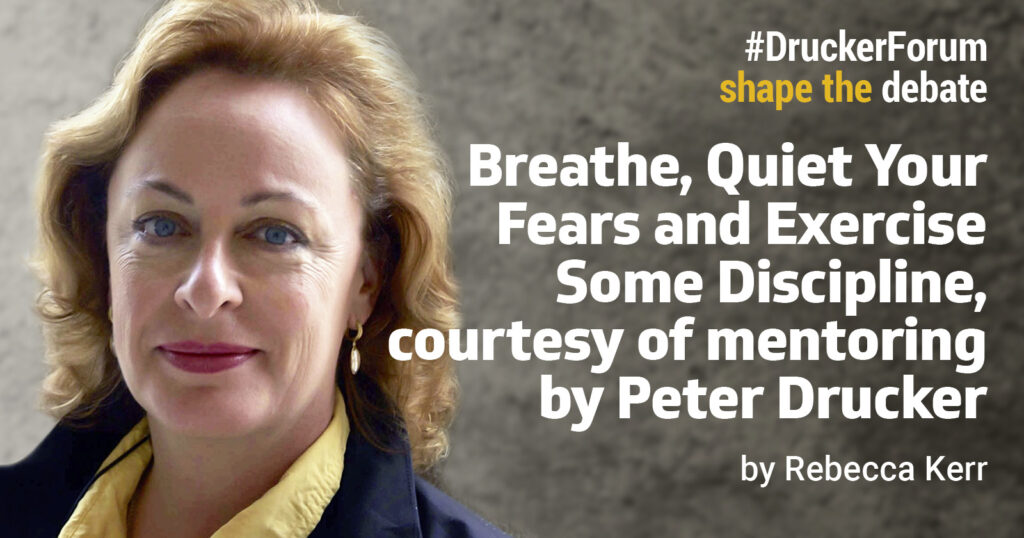
Have you ever felt conflict about a work request? When your boss asks you to do something and you have an instinctive response, that causes you to hesitate? Or a colleague you respect asks you to contribute your thoughts but outside factors give you pause, and you question whether you should or shouldn’t?
I found myself in that situation recently, when asked to contribute to this professional blog about a company and person I had the privilege of interviewing in November 2022 for the Global Peter Drucker Forum. The 2022 Forum theme was Driving Performance that Matters.
My conversation was with Radoslaw Kedzia, Vice-President, Central and Eastern Europe and Nordic Regions, for Huawei Corp, a leading global telecommunications supplier. From our short conversation, I came away impressed with both Huawei’s strategic interest in extending digital capabilities for inclusion of every person, home and organization for a fully connected and intelligent world, and an equal corporate value of building trust with customers through a focus on cybersecurity as an essential corporate value. In addition, Kedzia shared Huawei’s insistence on carefully monitoring trust as a key business performance indicator, measured in how customers pursue and develop their relationship with Huawei as a result of this focus. The Huawei CEO confirms that “it is a commitment that will never be outweighed by the consideration of commercial interests.”
Today, due to growing polarization within and among nations, increasing activity by extremist groups, ongoing trade restrictions or sanctions, supply chain collapse, wars, and the severe impact of numerous natural disasters, conflict areas abound. As we can all see, innovation to meet these challenges is urgent and necessary.
Today, there are trade conflicts with the Huawei Corporation. Notably, the US Department of Commerce has imposed a trade ban cutting off Huawei from American technology.
As a result, I hesitated to write this post. Then, I found a model to help me deal with the conflict and uncertainty – Peter Drucker’s 2002 article in Harvard Business Review entitled The Discipline of Innovation.
Peter Drucker encouraged discourse across diverse disciplines, diverse areas of expertise and experience. He attributed his ability to think and innovate to his growing years as a young man listening to the conversation of different groups of people attending salons in his parents’ home in Vienna. As an innovator in management science and practice, he had a model for dealing with complex topics and events as possible sources for innovation. Now is the time to remember his words and emulate his practice.
Conversations are essential, and innovation is necessary to find solutions. For Drucker, “there are seven areas of opportunity for innovation, some of which lie within particular companies or industries and some of which lie in broader social or demographic trends”:
- Unexpected occurrences The trade ban impacts ongoing operations and requires the assessment of new partnership models, suppliers, and product designs with available technology.
- Incongruities With the ever-increasing move to digital in all industries, and a known attachment to familiar operating systems, apps and user interfaces, today’s customers are unwilling to accept restrictions on their access to data, apps, locations, or technology, and demand equal access to services.
- Process needs Supply chain impacts require considering new partners, new manufacturing methods and potentially changing key components. Chip supply substitutes are urgent.
- Demographic changes Use of digital applications is growing exponentially and the demand for workable solutions for smartphones and other personal digital tools continue to grow – even across aging populations. The world needs digital.
- Changes in perception All of this has the potential to impact brands in the telecoms space. Clearly Huawei is prominently in the news, but issues around chips, the supply chain, cybersecurity exposure from aging software or apps concern other telecom vendors as well as Huawei.
- New knowledge Things change. As a result of innovation, revised trade agreements or new market entrants, perceptions about current telecommunication offerings could change and markets shift to the new options. Time will tell.
This is just a quick list of possible avenues to take to successful innovation, which I believe is what Huawei is exploring. It is time to learn, open the conversation and use the moment to apply the discipline of innovation. Thank you, Peter Drucker, for inspiring discussion and thinking to quiet the emotions and fear.
About the author:
Rebecca Kerr is a retired senior executive from IBM, where she led Fortune 100 digital transformation programs. She is currently a board director, entrepreneur and angel investor with Golden Seeds, a group funding high-potential, women-led businesses.

